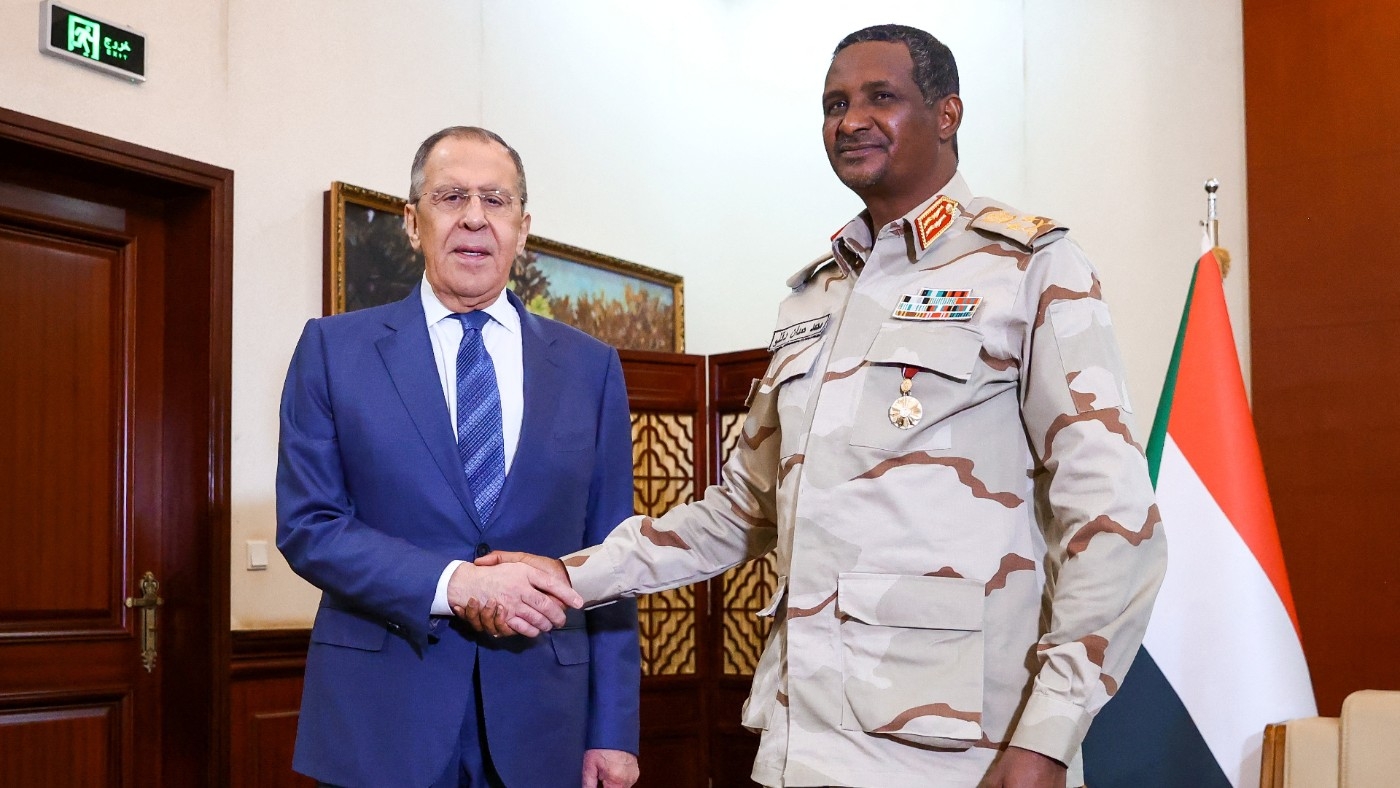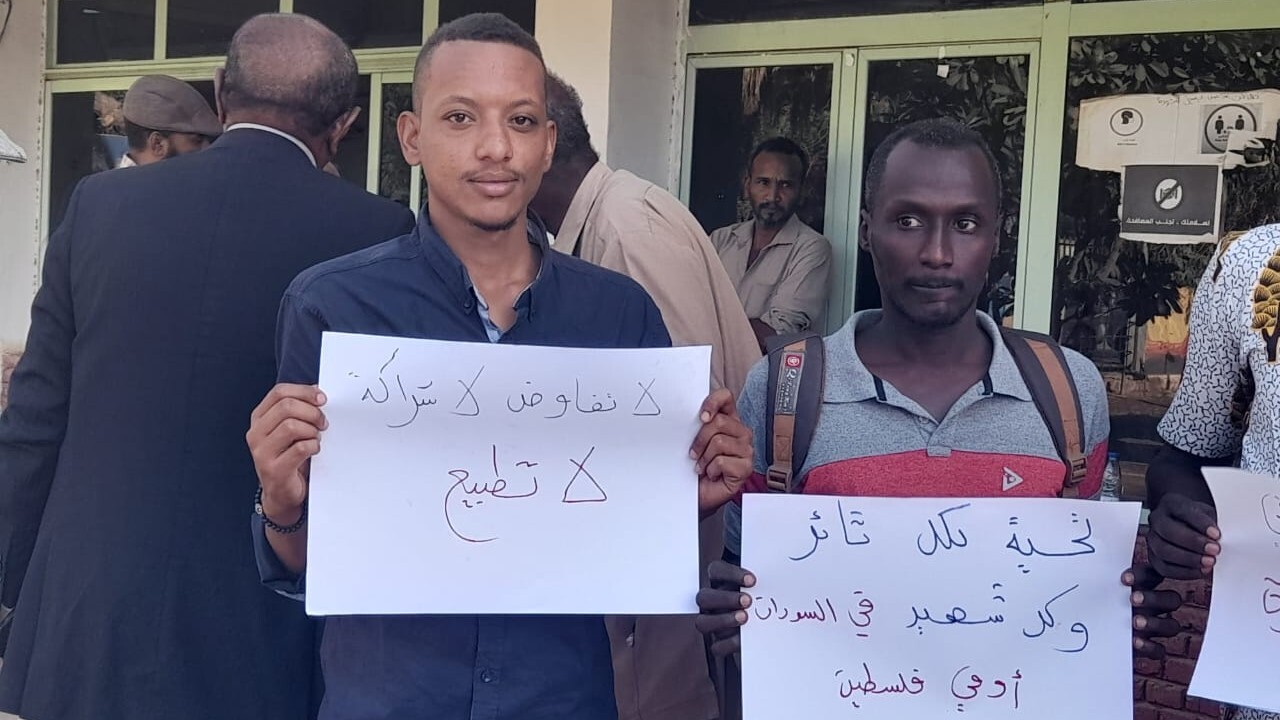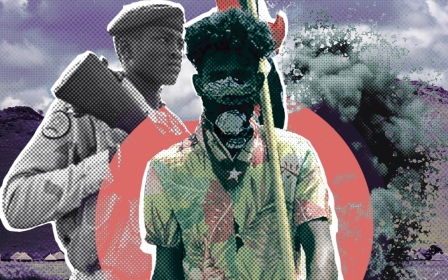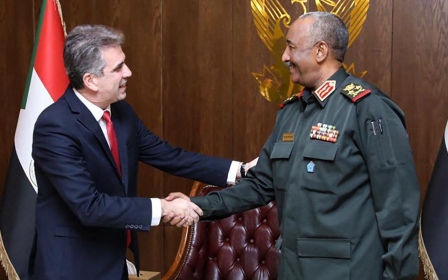Sudan: All roads lead to Khartoum as Russia, Israel and West vie in game of thrones

Everyone is coming to Khartoum.
At the end of last week, an Israeli delegation that included Foreign Minister Eli Cohen met Sudan’s ruling General Abdel Fattah al-Burhan as part of what the Israelis called a “historic diplomatic visit” intended to pave the way for the signing of a peace agreement later in the year.
On Wednesday, Russian Foreign Minister Sergei Lavrov arrived in the Sudanese capital as part of a tour that includes Iraq, Mali and Mauritania.
'Seen from Khartoum, the Israeli, Russian and envoy visits underscore the power plays within the coup forces'
- Kholood Khair, Confluence Advisory
Lavrov held separate meetings on Thursday with Burhan, leader of the Sudanese Armed Forces, and his deputy, Rapid Support Forces (RSF) commander Mohamed Hamdan Daglo, commonly known as Hemeti.
At a press conference in Khartoum on Thursday, Lavrov said that the Russian mercenary Wagner Group was fighting terrorism in Central African Republic, that Russian military bases would be established on Sudan's Red Sea coast and that western powers were putting pressure on African governments to denounce Russia.
New MEE newsletter: Jerusalem Dispatch
Sign up to get the latest insights and analysis on Israel-Palestine, alongside Turkey Unpacked and other MEE newsletters
At the same time, envoys from the United States, France, Norway, the UK, Germany and the European Union met on Wednesday with local officials in order to push forward the framework deal signed between the Sudanese military and a coalition of major civilian actors in December 2022.
The timing of the visits seems too good to be coincidental.
“It does look like a bit of a power play,” Patrick Smith, editor of Africa Confidential, told Middle East Eye, referring to Sudan's military leaders.
Sudanese resistance committees, which have been at the heart of the country’s revolutionary opposition, have held a series of protests against the military and against the framework deal, which has prompted a great deal of anger on the streets of Sudan's cities.
Game of thrones
The flood of interested visitors comes as Sudan’s game of thrones continues, with Burhan and Hemeti increasingly at odds, Islamist figures connected to the regime of Omar al-Bashir re-emerging and the civilian opposition divided over how to wrestle power from the military.
The three forces connected to the military coup of October 2021 – Burhan, Hemeti and Islamist figures, including Ali Ahmed Karti, foreign minister under Bashir – have, according to Kholood Khair, founder of the Khartoum-based think tank Confluence Advisory, separate ideas about where Sudan is heading and who it should be dealing with to get there.
“Seen from Khartoum, the Israeli, Russian and envoy visits underscore the power plays within the coup forces. It’s about who will get them to where they want to go and in the quickest way possible,” Khair told MEE.
“The December framework agreement favours Hemeti. The Egyptians favour Burhan. Each side has its own track…The Islamists are opposed ideologically to Sisi’s Egyptian government but they will use it to get their friends in the military back in power,” Khair said.
'We are aware that there is a bit of tension between Burhan and Hemeti - they are partners in competition'
- Ehud Yaari, Israeli analyst
While the December framework agreement, which lays out a track for Sudan’s transition to a civilian government, is endorsed by the Quad group – the United Arab Emirates, UK, Saudi Arabia and the US – as well as the EU, African Union and United Nations, it does not include Egypt, which is pursuing a parallel track with political factions close to Burhan.
Salah Gosh, Sudan’s former spy chief, lives in Cairo and is said to be key to the Egyptian track. It is also thought that he paved the way for Sudanese intelligence agents to visit Washington in January.
Egypt has deeper ties to Sudan than any other foreign power but, as Smith said, it is “now losing Sudan as an ally, as Sudan gets closer to Ethiopia and the politics of the Grand Renaissance Dam change.”
Egyptian President Abdel Fattah el-Sisi is an old ally of Burhan’s, but the Sudanese general is backed by Sudan’s Islamists, who are connected to Sisi’s arch enemies, the Muslim Brotherhood.
Most of the Sudanese resistance committees, together with the Sudanese Communist Party, are deeply critical of the December accord, which was signed on the civilian side by the Forces of Freedom and Change (FFC) and has been met with widespread anger on the streets.
The deal prompted a split in the FFC and the creation of the FFC-Democratic Bloc, which opposes it. Critics of the December agreement argue that it was the result of highly secretive talks, that it ignores most of the demands of Sudan’s many regions, and that it basically keeps the military in control.
In a twist of fate, Russia, which is at odds with western powers following its invasion of Ukraine, is aligned with them on the framework agreement.
Russia’s interests in Sudan include mining - particularly gold - and wheat and fertiliser exports. The presence of the Wagner Group in Sudan and the surrounding region has been well established by MEE.
Hemeti is thought to be connected to Wagner through his RSF militia and has close ties to Moscow, which he visited as the war in Ukraine began.
During that visit, Russia’s desire to establish a port on the Red Sea was discussed and Hemeti brought the proposal back with him to Khartoum. Sources familiar with the talks told MEE that Burhan was opposed to the Russian proposal and it now looks like the port project will be taken on by the UAE, though Lavrov claims otherwise.
A peace deal with Israel
Israel’s interest in Sudan is partly symbolic and historic, with Sudan a stalwart supporter of the Palestinian cause before its recent normalisation agreement with Israel. “The three ‘noes of Khartoum’. No more. Shalom from Sudan,” Tal Becker, a member of the Israeli delegation, tweeted last week.
Becker was referring to the Khartoum Resolution of 1967, issued at the end of the Arab League summit, which became known as the “three nos”: “no peace with Israel, no recognition of Israel, no negotiations with it”.
Sudanese battalions fought in the 1948 war against Israel and in the 1973 Middle East war. Under Bashir, who ruled Sudan from 1989 to 2019, weapons bound for Hamas and other Palestinian armed groups passed through Sudan.
Because of this, Israel bombed factories and warehouses in Sudan on several separate occasions, Ehud Yaari, an Israel-based fellow at the Washington Institute, told MEE. “The Red Sea is very important to Israel - to make sure the Red Sea coastlines are not hostile to Israel,” Yaari said.
In 2016, Bashir, short on funds from his cash-strapped ally Iran and worn down by US sanctions, began to soften his stance and looked to develop a relationship with Israel.
'The Saudis, the Emiratis and the Sudanese and everyone else do not need to live with the Palestinians. Israelis do'
- Alon Pinkas, Israeli diplomat
In 2020, after Bashir had been deposed, Burhan met Israeli Prime Minister Benjamin Netanyahu in Uganda at a meeting brokered by Ugandan President Yoweri Museveni and his wife Janet.
The Donald Trump-brokered normalisation deals, known as the Abraham Accords, followed not long after.
Last week, Burhan was once again the leader the Israelis had come to visit, though MEE understands that Hemeti has a relationship with the Mossad, Israel’s intelligence agency.
The two military players have different sources of power and wealth and are pursuing parallel foreign strategies as well as parallel domestic plans. This also means that they deal with different parts of different foreign governments, as well as different power brokers within those governments.
Burhan and Netanyahu “get along very well”, said Yaari, who has been involved in developing the relationship between Sudan and Israel for a number of years.
“The game is not being played by the Israeli foreign ministry, it is being played by defence and intelligence,” Yaari said, referring to who on the Israeli side was driving relations with Sudan.
“We are aware that there is a bit of tension between Burhan and Hemeti - they are ‘partners in competition’. Relations are mainly with Burhan and less so with Hemeti, who is more problematic,” Yaari said.
Nevertheless, he added, “Hemeti has close contacts in the Emirates. Without them and without the Saudis, Sudan would not have gone forward with normalisation with Israel.”
Hemeti is close to Abu Dhabi’s ruler, Mohammed bin Zayed, and Sudan reportedly exports $16bn of gold to the UAE every year. Formerly the leader of Darfur’s feared Janjaweed militias, Hemeti and his brothers now control gold mines in the region.
Yaari said that for Netanyahu, Sudan is also key to something that has become “almost an obsession”: putting on direct flights from Israel to South America.
In order to do this, Israel needs to be able to fly planes through Sudan's vast airspace. Netanyahu has already secured this agreement from Chad and is looking to talk to Mali and Mauritania. Discussions with the Nigerian government about direct flights from Tel Aviv are underway.
The Palestinian issue
Alon Pinkas, an Israeli diplomat who served as an adviser to four Israeli foreign ministers, told MEE that the Sudan deal was tied up with Netanyahu’s “envelope” theory - the idea that if Israel can normalise relations with a succession of governments in the wider Arab world, the prime minister can prove that “no one cares about the Palestinians and that the Palestinian issue is not central to the Arab-Israeli conflict”.
“Everything about him is PR,” Pinkas said of Netanyahu. The diplomat said he had never seen an Israeli government as bad as the current extreme right-wing one, adding that normalisation agreements were not a sign that the plight of the Palestinians had been forgotten by the Arab world.
“Palestinians have to live with Israelis, and vice versa,” he said. “The Saudis, the Emiratis and the Sudanese and everyone else do not need to live with the Palestinians. Israelis do.
“Netanyahu is saying the two-state solution is unviable. The next demand will become one state with equal rights for all citizens. This will become a world issue if it is denied. Israel denying this will have nothing to do with all the deals Netanyahu has done… He is selling people snake oil with these normalisation deals.”
On the streets of Sudan, protests hit out at the Israeli meeting and Hemeti and Burhan's pursuit of their own foreign policy.
Such diplomatic moves are seen as a way of circumnavigating democracy and shoring up power for the military elite. Just as in Morocco and elsewhere, the difference between what people feel about the Palestinian cause and what their governments are doing is stark.
Resistance committees, leftists parties, Islamic groups and activists all came out against the meeting with Cohen and further steps toward a peace deal with Israel.
Yusra Mahjob, a spokeswoman for the resistance committees, told MEE that they opposed the deal because it stood against the revolution not just in Sudan but in the entire region.
'Israel is a racist and terrorist state that stands against the rights of the Palestinians. Israel represents the interests of a new colonialism'
- Yusra Mahjob, Sudan resistance committees
“We can’t call for the liberty of the Sudanese people and neglect the Palestinians,” she said.
“Israel is a racist and terrorist state that stands against the rights of the Palestinians. Israel represents the interests of a new colonialism. We see that land grabbing in Palestine is continuing so we are against the oppression everywhere.”
Leftist parties, including the communist and Baathist parties, also reject normalisation with Israel and stand against the military rulers of Sudan. Arab Socialist Ba'ath Party spokesman Wagdi Salih said that the Sudanese army had no right to determine the country's foreign policy.
“We are against normalisation with Israel and will resist that in the streets. We are also against the use of these tactics by the military in order to stay in power,” Salih told MEE.
“We also see wide external intervention right now from many governments around us, so we urge the revolutionaries to be very cautious and decisive in responding to these attempts to abort the Sudanese revolution.”
Dealing with Washington
For Khartoum’s power players, the Israeli visit was in part about the United States.
On 30 January, Sudan released the killer of USAID workers John Granville and Abdel-Rahman Abbas Rahama, who were shot dead in Khartoum in 2008. The move was seen as a sign of increasing Islamist influence and was condemned by the US.
Developing ties with Israel is a form of atonement. “Israel is a way of buying US support. It’s not quite a get-out-of-jail-free card for the Sudanese military but it’s nearly that,” Smith said. “If the transition rumbles on as the military play for time, they can point to a deal with Israel as a mark in their favour.”
Sudan’s generals would also no doubt love to get their hands on Israeli-made Pegasus spyware, which was also a great prize for the UAE. But, Yaari told MEE, “we won’t sell arms of cyberwarfare to them right now”.
On the civilian side, Israeli technology – particularly in desalination and irrigation - would be a boon to Sudanese agriculture.
As the world’s big powers pass in and out of Khartoum, Sudanese activists look for a way back toward democracy. The December framework agreement, championed by Hemeti, still contains many unresolved issues.
As it stands, it will leave the power of Sudan’s military and militia groups very much intact. The architects of Sudan’s ongoing revolution, out on the streets week in, weekout, are not going to accept that.
Middle East Eye delivers independent and unrivalled coverage and analysis of the Middle East, North Africa and beyond. To learn more about republishing this content and the associated fees, please fill out this form. More about MEE can be found here.







